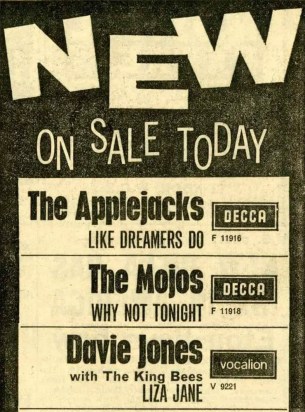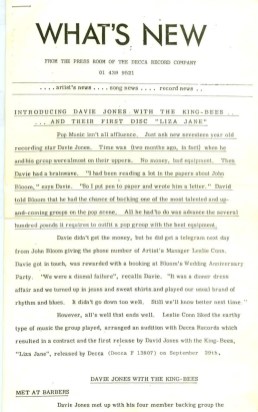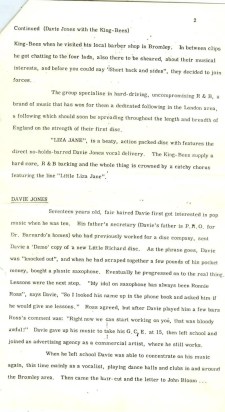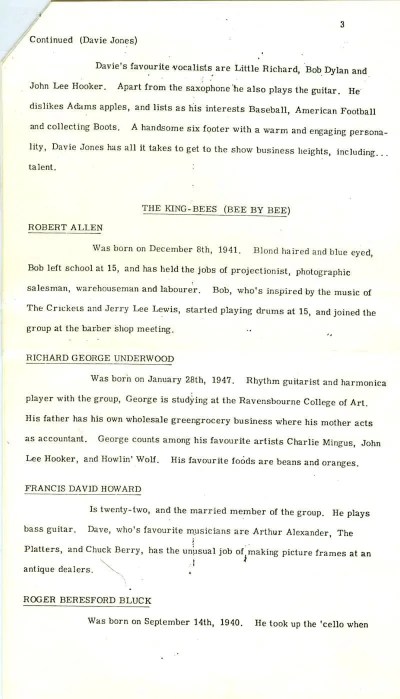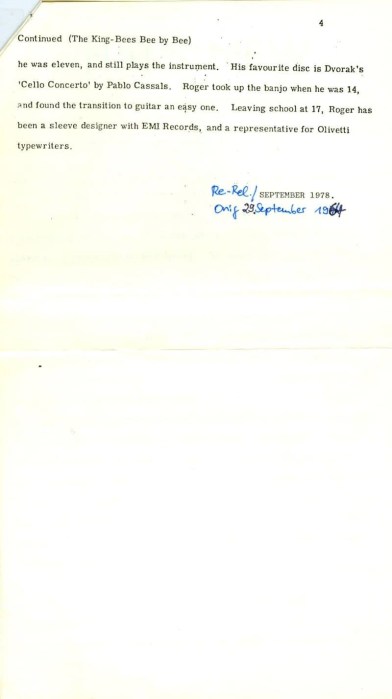 Written by: Leslie Conn
Written by: Leslie Conn
Recorded: May 1964
Producer: Leslie Conn
Released: 5 June 1964
Available on:
Nothing Has Changed
Toy:Box
Laughing With Liza
Personnel
David Bowie: vocals, saxophone
George Underwood: guitar, harmonica, vocals
Roger Bluck: guitar
Francis Howard: bass guitar
Bob Allen: drums
David Bowie’s first-ever record release, ‘Liza Jane’, was issued in 1964 and credited to Davie Jones with the King Bees.
That was David and I, in my mum and dad’s house, in the kitchen, sitting there with a guitar just fooling around. Leslie Conn put his name to that. He said, ‘Oh, try this line.’ He’d written some words; I don’t think we even used them. He thought he wrote it. When I went solo, my managers were Leslie Conn and Peter Grant. Peter took me to one side and said, ‘It’s a shame about Leslie. He’s the only Jewish boy in the music business who can turn half a crown into two-bob.’ He was saying he was a bit of a loser, you’re not going to be anywhere with him. He was a nice enough guy.
David Bowie: Ultimate Record Collection (Uncut)
The single was released on Decca Records’ subsidiary label Vocalion Pop, with the catalogue number V.9221. Its b-side was ‘Louie, Louie Go Home’. Just 3,500 copies were reportedly pressed, many of which remained unsold.
Both songs had been recorded earlier in 1964, during a seven-hour session at Decca Studios in West Hampstead, London.
Although ‘Liza Jane’ was an R&B adaptation of an old blues standard, the songwriting was credited to Leslie Conn, a Decca talent scout and effectively Bowie’s then manager. Conn also took the producer’s credit.
It was an old Negro spiritual that we played around with. I don’t know how he came to put his name on it.
The Complete David Bowie, Nicholas Pegg
‘Liza Jane’ was reviewed positively by the UK music weeklies New Musical Express, Record Mirror, and Record Retailer, and was played on the pirate station Radio Luxembourg.
The single was released on 5 June 1964. The following day it was one of the songs featured on BBC television’s Juke Box Jury, where it was deemed a ‘miss’ by all but one of the studio judges. Bowie was present in the studio, and was briefly shown reacting to the verdict. This was his first television appearance.
On 19 June, Davie Jones with the King Bees appeared on the ITV show Ready, Steady, Go!, performing ‘Liza Jane’ before the studio audience. The band also appeared on the BBC Two’s The Beat Room on 27 July.
The song was not a commercial success, and failed to chart. Following Bowie’s ascent to global superstardom, the single became highly sought after among record collectors.
When David and I parted company I went off to live and work in Majorca for a few years. One day I was on the phone to my mother and she said, ‘What shall I do with those records I have in the garage?’, which were a few hundred copies of ‘Liza Jane’. So I replied, ‘Throw them out,’ and she did.
The Complete David Bowie, Nicholas Pegg
By August 1964 Bowie had left the King Bees and moved on to the Manish Boys, who performed ‘Liza Jane’ for a time during their live sets.
When we were in the King Bees, David turned up for rehearsal one day and said, ‘Actually, I’ve got another band. I’m off. See you, bye.’ We were left high and dry. He’d been rehearsing with the Manish Boys while he was with us. He realised that we weren’t going anywhere, that’s fair enough. He wanted to go somewhere.
David Bowie: Ultimate Record Collection (Uncut)
Decca reissued ‘Liza Jane’ in 1978, yet it was barely more successful than in 1964. It also appeared on the 1991 compilation Early On (1964–1966), and on the 2005 various artists collection And The Beat Goes On.
Bowie re-recorded ‘Liza Jane’ during the sessions for his unreleased Toy sessions in 2000. The full album leaked online in 2011.
The song was also unexpectedly revived by Bowie on 5 June 2004 during a show at the PNC Bank Arts Center in Holmdel, New Jersey. This was the 40th anniversary year of the song’s release, and the final US date of A Reality Tour.
In 2014 ‘Liza Jane’ was included as the final song on the three-CD edition of Bowie’s compilation Nothing Has Changed.


